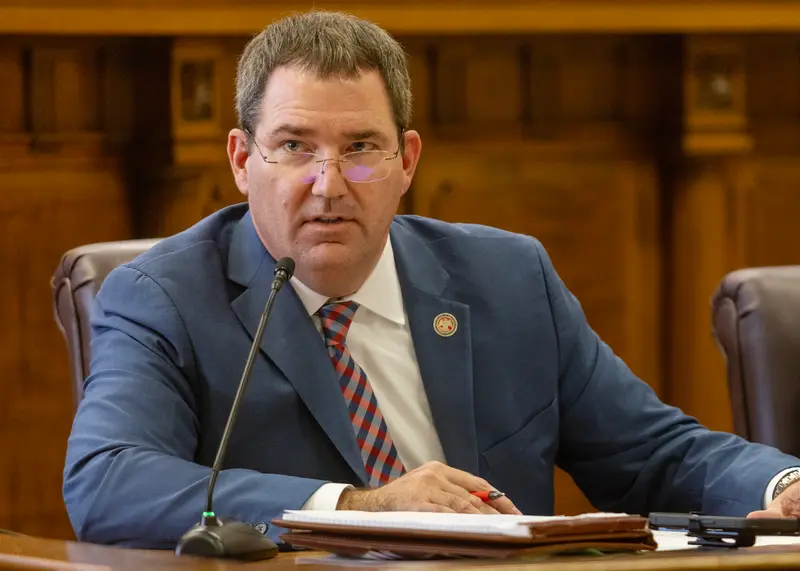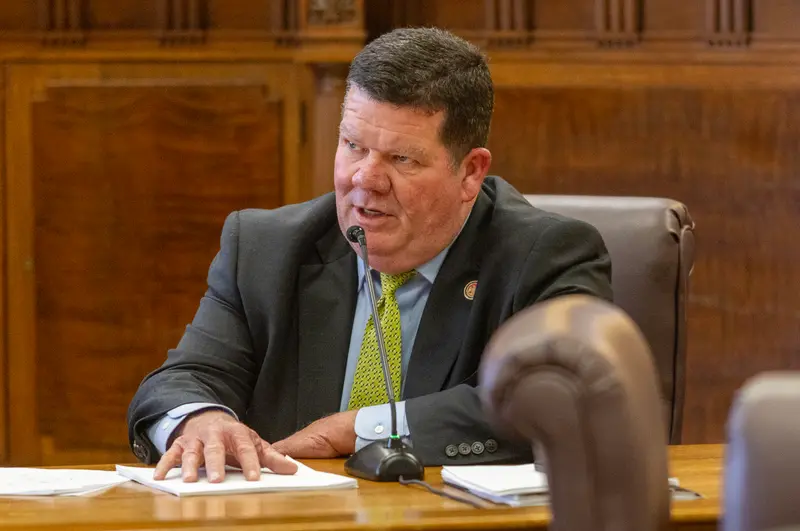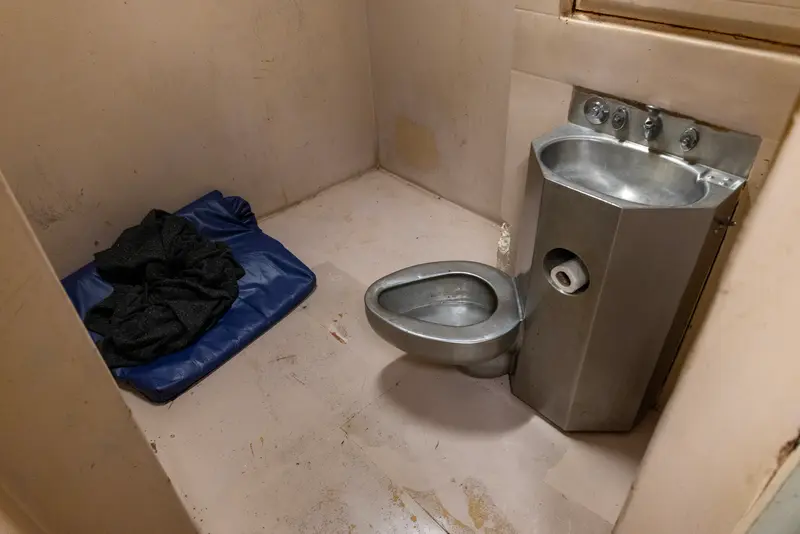This article was produced for ProPublica’s Local Reporting Network in partnership with Mississippi Today. Sign up for Dispatches to get stories like this one as soon as they are published.
Lawmakers Could Limit When County Officials in Mississippi Can Jail People Awaiting Psychiatric Treatment
ProPublica’s reporters want to talk to mental health providers, health insurance insiders and patients as we examine the U.S. mental health care system. If that’s you, reach out.

Key Mississippi lawmakers have introduced several bills that would drastically limit when people can be jailed without criminal charges as they await court-ordered psychiatric treatment.
The proposals follow an investigation by Mississippi Today and ProPublica finding that hundreds of people in the state are jailed without charges every year as they go through the civil commitment process, in which a judge can force people to undergo treatment if they’re deemed dangerous to themselves or others. People who were jailed said they were treated like criminal defendants and received no mental health care. Since 2006, at least 17 people have died after being jailed during the commitment process, raising questions about whether jails can protect people in the midst of a mental health crisis.
Civil rights lawyers contend Mississippi’s practice is unconstitutional because it amounts to punishing people for mental illness, but the state’s civil commitment law allows it. That law spells out the process by which people suffering from severe mental illness can be detained, evaluated and ordered into treatment. Under the law, those people can be held in jail until they’re admitted to a state psychiatric hospital or another mental health facility if there is “no reasonable alternative.” If there isn’t room at a publicly funded facility or open beds are too far away, local officials often conclude that they have no other option besides jail.
“Putting a person in jail because they’re hearing voices and you don’t know what to do with them — that’s not right,” said state Rep. Kevin Felsher, R-Biloxi, one of the lawmakers behind legislation to curtail the practice. The news stories, he said, showed that people are jailed for longer than he thought and that Mississippi is unique in doing so.
The proposals represent the biggest effort to change the state’s civil commitment process since at least 2010, according to a review of legislation and interviews with mental health advocates. That year, lawmakers standardized the commitment process across the state and gave county officials the option to call on crisis teams first. A measure that would have prohibited jail detentions altogether ultimately failed.
A bill proposed by Felsher would allow jail detentions during the commitment process only for “protective custody purposes and only while awaiting transportation” to a medical facility. It would restrict such detentions to 72 hours.
A bill authored by state Rep. Sam Creekmore, R-New Albany, chair of the House Public Health and Human Services Committee, would clamp down on the practice even more, allowing counties to jail people without criminal charges only if they are “actively violent” and for no longer than 24 hours.
The vast majority of the 2,000 jail detentions in 19 counties analyzed by Mississippi Today and ProPublica lasted longer than 24 hours. About 1,200 lasted longer than 72 hours. (Those figures include detentions between 2019 and 2022 for both mental illness and substance abuse; the legislation would address only the commitment process for mental illness.)

Creekmore’s bill, which passed out of committee without opposition Thursday, aims to reduce unnecessary commitments by generally requiring people to be screened for mental illness before paperwork can be filed to have them committed. Those screenings would be conducted in most cases by community mental health centers — independent organizations, partly funded by state grants, that are supposed to provide mental health care close to home. That bill also would require those organizations to treat people while they’re in jail.
A bill authored by Sen. Nicole Boyd, R-Oxford, to increase state oversight of community mental health centers contains language similar to Creekmore’s proposal restricting jail detentions. Her bill has been referred to the Judiciary A committee, which is chaired by one of its co-authors, Sen. Brice Wiggins, R-Pascagoula.
The bills would bring Mississippi more in line with other states that allow people going through the civil commitment process to be jailed in limited circumstances. South Dakota permits jail detentions without criminal charges but limits them to 24 hours. Wyoming permits them in an “extreme emergency” and only for 72 hours before a hearing.
The Mississippi Department of Mental Health says reforming the commitment process is a priority this legislative session. “We don’t want someone to have to wait in jail simply because they need mental health treatment,” said Wendy Bailey, director of the agency, at a January conference attended by county officials from all over the state.
I think you’ll find all 82 clerks, all 82 sheriffs, all 400 supervisors understand that the jail is not the place they need to be. But there has to be a place. If it’s not the jail, there has to be a place available.
But the Mississippi Association of Supervisors, which represents county governments, has raised questions about whether the bills would force county officials to spend more money. Under state law, counties are responsible for housing residents going through the commitment process until they are admitted to a state hospital. Some local officials contend they don’t have any place other than jail to put people.
“I think you’ll find all 82 clerks, all 82 sheriffs, all 400 supervisors understand that the jail is not the place they need to be,” said Bill Benson, who as Lee County’s chancery clerk coordinates the commitment process there. “But there has to be a place. If it’s not the jail, there has to be a place available.”
Derrick Surrette, executive director of the Mississippi Association of Supervisors, said county leaders are “all for” keeping people out of jail while they wait for mental health care. But, he said, they’re concerned that they’ll be forced to pay for treatment in private facilities because there aren’t enough publicly funded beds. None of the proposals would expand publicly funded treatment beds, nor would they provide funding to counties. The association hasn’t taken a position on the bills to limit jail detentions.
“It’s a whole lot of legislation being proposed telling the county and a regional mental facility what to do,” Surrette said. “Is there very much in there telling what the state shall do?”
The Department of Mental Health advises local officials to direct people who need help to outpatient mental health care when appropriate and to rely on the civil commitment process only when needed. If the commitment process can’t be avoided, the department says officials should work with their local community mental health centers to seek alternatives to jail.

The state has expanded the number of beds in crisis stabilization units, which are designed to provide short-term treatment in a less restrictive setting than state hospitals. Chancery clerks and sheriff’s deputies complain that those facilities frequently refuse to accept people they deem to be violent or in need of additional medical care, though state data shows those refusals are declining.
An additional bill filed by Felsher would require counties to pay for care at a medical facility if a judge has ordered someone into treatment, no publicly funded bed is available and the person can’t pay for treatment. Although the Mississippi Association of Supervisors hasn’t taken a position on that bill, either, it opposed a similar provision last year because the measure didn’t provide any funding.
At a hearing in November 2022, Felsher asked Benson, the chancery clerk in Lee County, whether he would support his county paying hospitals to treat residents as an alternative to jail. Benson responded that if he did, “My supervisors would hang me.”
Benson said in an interview that it costs just $40 a day on average to jail someone in Lee County. By contrast, Neshoba County, which is among those that contract with private providers, pays between $625 and $675 a day to Alliance Health Center to treat county residents when no public bed is available.
Felsher said he hopes to expand the availability of public treatment facilities so counties aren’t on the hook except in rare circumstances. But he also said he believes the cost of alternatives can’t justify jailing people who haven’t been charged with crimes.
“We can’t send people with mental illness to jail because the county doesn’t want to pay for it,” he said. “If it is a fight, it’s a fight that I will have. We may not win it, but we’ll have it.”
Staffers with Disability Rights Mississippi say the bills don’t go far enough because they don’t ban jail detentions outright. At least a dozen states, including neighboring Alabama, Louisiana and Tennessee, have done so.
Without such a ban, Disability Rights Mississippi staff say they’re planning to sue the state and some counties, alleging the practice is unconstitutional. A federal lawsuit in Alabama led to a ruling in 1984 prohibiting the practice there.
“Mississippi Today’s reporting has revealed the horrifying scope of this problem, including those who have met an untimely death and data to back it up,” said Polly Tribble, the organization’s director. “I hope that, in light of these dire situations, the Legislature will be motivated to address these issues.”
Bailey, head of the state Department of Mental Health, said she was not aware of the possibility of litigation until Mississippi Today asked about it. She said her agency is working to find ways to make sure people get mental health treatment without going through the civil commitment process, and to restrict the use of jail when they do.
Agnel Philip of ProPublica contributed reporting and Mollie Simon of ProPublica contributed research.
This article was produced for ProPublica’s Local Reporting Network in partnership with Mississippi Today. Sign up for Dispatches to get stories like this one as soon as they are published.
This article was produced for ProPublica’s Local Reporting Network in partnership with Mississippi Today. Sign up for Dispatches to get stories like this one as soon as they are published.
Agnel Philip of ProPublica contributed reporting and Mollie Simon of ProPublica contributed research.
Agnel Philip of ProPublica contributed reporting and Mollie Simon of ProPublica contributed research.







